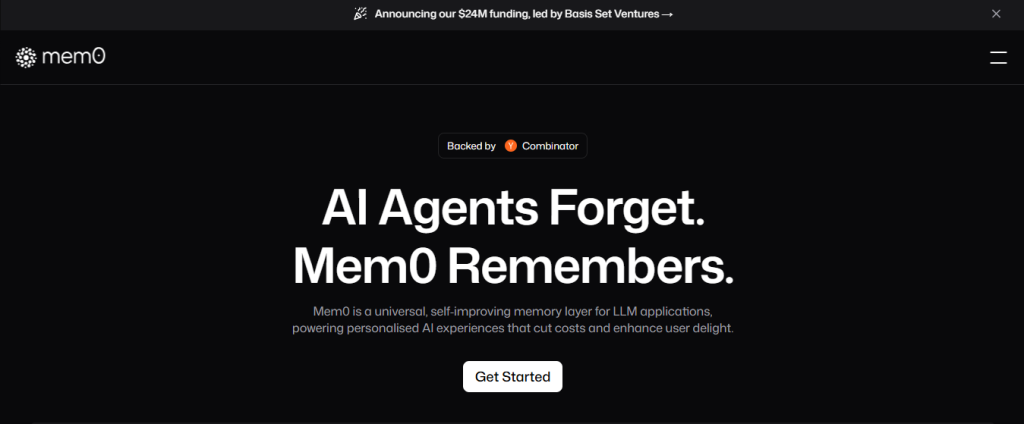Mem0 Raises $24 Million Series A to Build the Memory Layer for AI – Turning Every LLM Into a Personalized Intelligence Engine
November 4, 2025
byFenoms Start-Ups

Mem0, the startup that enables AI applications to remember user context across interactions, has raised $24,000,000 in Series A funding. The round includes Basis Set Ventures, Peak XV Partners, GitHub Fund, Y Combinator, Scott Belsky, Dharmesh Shah, and others. Founded by Taranjeet Singh and Deshraj Yadav, Mem0 solves one of the biggest limitations of large language models: the fact that they forget everything once a conversation ends.
Mem0 introduces persistent memory - a universal memory layer that lets any AI model remember user-specific details, adapt its personality, and build long-term context across chats, apps, or tools. Instead of re-teaching an AI who you are every time, Mem0 ensures the AI already knows. With a few lines of code, developers can give their AI application memory - securely, privately, and at scale.
In a world where every company is building an AI feature, Mem0 gives those features the one thing that makes software feel human: continuity.
Reframing AI: From Chatbots to Memory-Driven Systems
Today’s AI tools are powerful, but forgetful. Interactions reset. Personalization disappears. Context evaporates. That’s because the majority of LLMs - including GPT-based models - don’t store personal data by default. They operate statelessly. Mem0 flips that dynamic. Instead of treating conversations as isolated events, Mem0 structures, stores, and surfaces relevant memory on demand.
When a user interacts with an AI across days, weeks, or months, the AI remembers preferences, previous conversations, personal data, and decision patterns. Software stops feeling transactional, and starts feeling relational.
Mem0 doesn’t improve the model.
It improves the experience of using the model.
Infrastructure Over Features: The Memory Layer Every AI Will Need
Most companies building AI try to differentiate by adding new features - faster chat, better UI, different agents. Mem0 isn’t building a feature. It’s building the memory infrastructure every AI product will rely on. Developers can drop in Mem0’s SDK and instantly add user memory to any AI model, whether it’s built on Llama, Claude, GPT, or a proprietary model.
This is the difference between optional tooling and foundational infrastructure:
Tools support the workflow.
Infrastructure becomes the workflow.
Mem0 lives underneath every AI interaction, storing what matters and automating recall when needed. That makes applications sticky. It increases engagement. It creates personalization at scale. And for developers, it eliminates all the complexity of secure PII storage, privacy, encryption, and memory relevance matching.
Mem0 becomes the memory brain.
AI models become the reasoning brain.
Category Leaders Don’t Add Features - They Redefine Defaults
Here’s where Mem0 offers a masterclass for founders: instead of adding something new to AI apps, they changed the baseline expectation for what AI should already do. The biggest unlock in product building isn’t inventing new capabilities - it’s correcting the behavior users assumed existed.
Users assume AI remembers.
Mem0 makes that assumption true.
This is the core strategic play:
- Don’t build add-ons that improve functionality.
- Build foundations that change the definition of functionality.
Founders should remember something here:
You win by building what users think should already exist.
Investor Confidence and Strategic Alignment
Mem0’s investor lineup isn’t just capital - it’s signal. Basis Set Ventures and Peak XV Partners specialize in scaling infrastructure companies. The GitHub Fund signals developer adoption potential. With backing from Y Combinator and operators like Scott Belsky and Dharmesh Shah, the company now sits at the intersection of AI infrastructure, developer tooling, and SaaS personalization.
Investors didn’t back Mem0 because memory is a nice-to-have.
They backed it because memory will be required for every AI system that expects repeat users.
A Market Where Individualization Wins
AI with memory performs fundamentally better than AI without it.
The numbers reinforce why memory will become mandatory:
- 77% of consumers expect personalization in digital experiences.
- Apps with personalization see 2–3x higher engagement and retention.
- Memory-capable AI agents reduce user onboarding time by 40–60%.
- Developer adoption of AI SDKs and infrastructure is projected to reach $110 billion by 2030.
AI isn’t just competing on intelligence anymore.
It’s competing on relevance.
And as multi-agent systems and autonomous workflows take over enterprises, persistent memory becomes the difference between a tool that can execute a task - and a tool that can operate independently across time.
The Real Shift: AI Stops Starting From Zero
When an AI remembers:
- Preferences don't need repeating.
- Personal instructions don’t need re-teaching.
- Context becomes cumulative.
Mem0 turns interaction history into intelligence:
→ If a founder says “I prefer concise bullet points,” the AI remembers.
→ If a customer says “I’m interested in sustainability analytics,” every future recommendation aligns.
→ If a sales rep logs notes in a CRM, AI follow-ups are contextually aware.
The difference isn’t incremental.
It’s emotional.
Software finally feels like it knows you.
What’s Next for Mem0
The funding will accelerate product development, expand enterprise privacy tooling, refine API/SDK performance, and scale developer onboarding. Mem0 is expanding into:
- enterprise-grade memory governance
- multi-agent orchestration memory
- cross-app memory portability
In simpler terms:
Memory becomes a shared resource between any AI app a user interacts with.
Long term, Mem0’s vision is simple and massive:
every AI model will have memory because every user expects it.
Final Thoughts
Mem0 isn’t just improving AI.
It’s redefining the relationship between humans and software.
For decades, humans adapted to computers - repeating preferences, re-entering data, re-establishing context every time.
Mem0 flips that. The future isn’t humans learning software.
It’s software that learns humans.
Persistent memory isn’t a feature.
It’s the future of intelligence.









